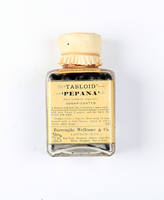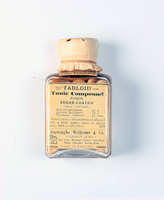Items
keywords is exactly
leather
-

Zinc Sulphate
"Astringent. One or two dissolved in an ounce of water, will be found useful as an eye-lotion, and as an injection or astringent lotion" (BWC 1925:144). -

Opium
"Anodyne, astringent, narcotic. Use with caution. In cholera and dysentery, one to two may be taken with a little water, by an adult, according to the symptoms of the case. For the relief of pain, one my be taken every three or four hours until desired effect is obtained" (BWC 1925:133). -

Tannin
"Styptic. To stop bleeding, one or more may be pulverised, and the powder applied direct to the wound. Internally, for haemorrhage, and for dysentery, etc. One or two may be powdered and taken in a glass of water; or they may be slowly sucked of the effect be desired in the mouth or throat" (BWC 1925:140). -

Pepana
"Digestive. One or two, swallowed whole, with a little water, after meals, in painful dyspepsia" (BWC 1925:134). -

Laxative Vegetable
"An excellent laxative or purgative, according to the dose taken. One, twice or thrice daily, in habitual constipation, or one to three at bed-time as an occasional purge" (BWC 1925:131). -

Tonic Compound
"Haematinic, tonic and stimulant. One to three, swallowed with a little water, twice or thrice daily, with or after food (BWC 1925:140). -

No. 254. 'Tabloid' Brand Medicine Chest (The Indian)
A small medicine chest, listed as BC666, kept in the Manuscripts and Archives Department of the University of Cape Town. Roughly 15cm in height and depth, and 20cm in width, it is made of metal and painted black, with the words ‘Trade Mark’, 'Tabloid' and ‘Brand’ printed under the keyhole, on its front. Fitted with a brown leather strap and metal clasps, the case suggests easy portability and containment. Manufactured by Burroughs Wellcome & Co. in the 19th century, these travelling Tabloid brand medicine chests accompanied eminent explorers such as Stanley, Scott and Shackleton on their travels – and was a firm favourite amongst missionaries and explorers coming to Africa, seen as a tool to combat ‘tropicality’. This particular chest belonged to Walter Floyd, a dentist born in Kent, who opened a practice in Cape Town in 1904, and bought it for a hunting trip he made to (then) Northern Rhodesia in 1913.


